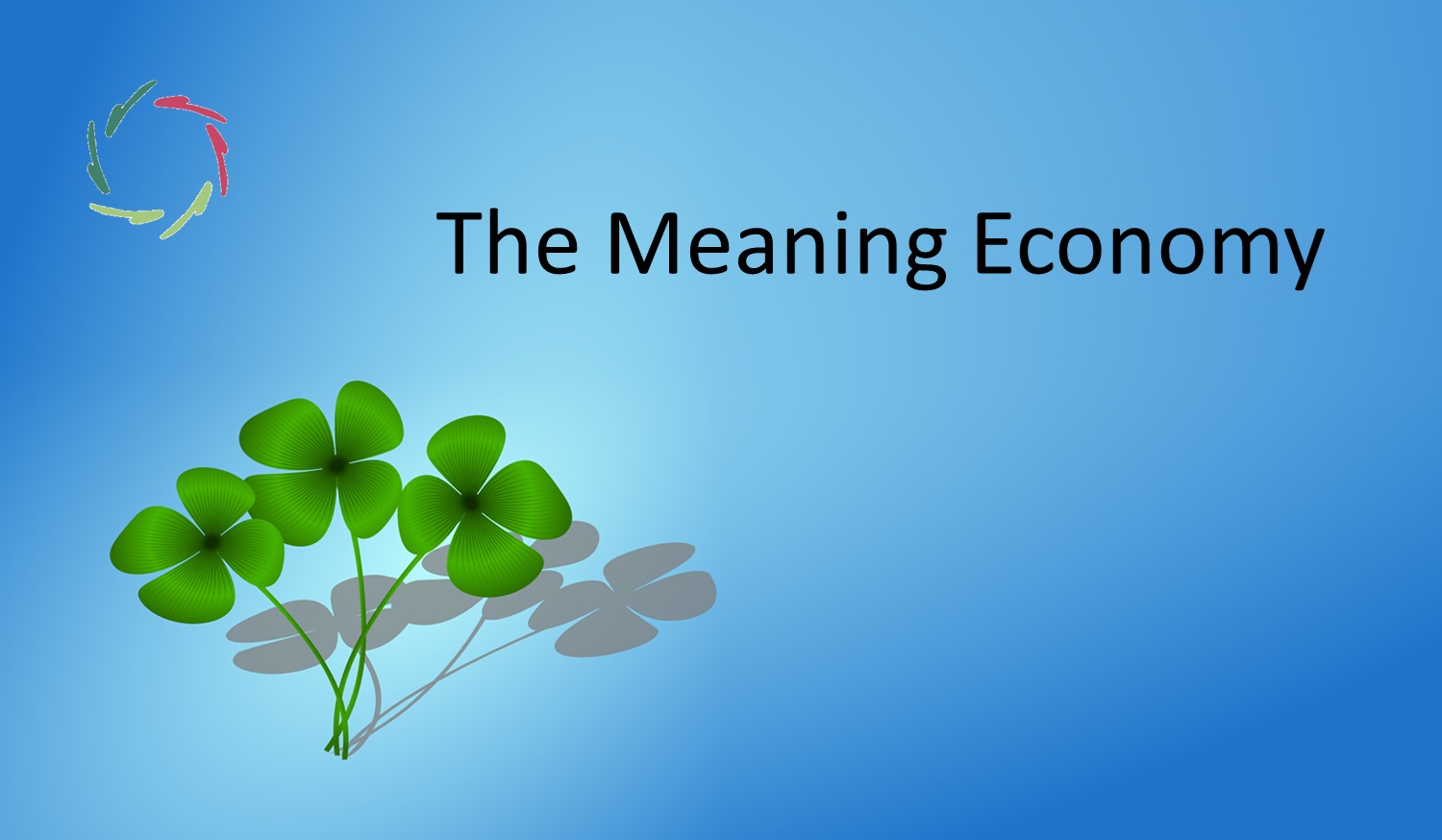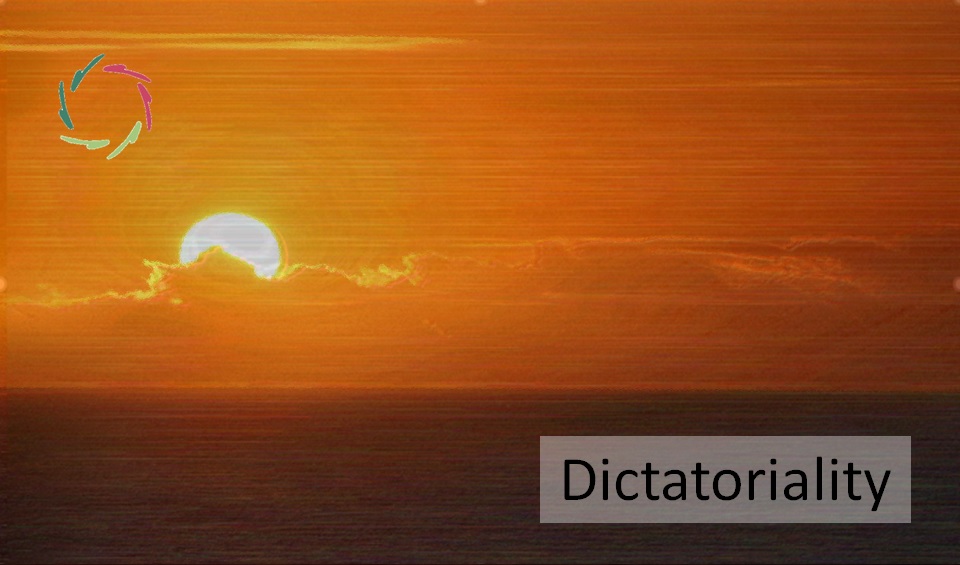The Meaning Economy

The traditional view of wealth, centered around GDP and economic power, is limited to the tangible ― money, assets, and possessions. Yet, as people strive to find purpose and fulfillment, it’s clear that the quality of our lives is measured in meaningful more than material wealth.
Enter the concept of the Meaning Economy: a vision where wealth is based not just on financial worth. This raises a powerful question for the 21st century: What if we started valuing meaning as highly as we value money?
The shift from money to meaning
The Meaning Economy may seem like a utopia from today’s perspective. Yet, if we look to history, it is actually a return to a more natural state — one that has prevailed for most of human existence. Until some thousands of years ago, in many parts of the world, people lived as hunter-gatherers, without the concept of tedious jobs done for money. They did what came naturally, living in connection with their community and environment. Production and consumption weren’t separate or purely transactional ― they simply flowed from the needs and rhythms of life.
Our present focus on financial ROI is a recent exception. For most of history, meaning, rather than monetary wealth, was the essence of human life. Envisioning a Meaning Economy is not about creating something new but returning to a deeply human way of living. In both past and future, the Meaning Economy connects us to what is real, lasting, and profoundly enriching ― providing a broader, more fulfilling definition of wealth.
The limits of money as wealth
Money provides access, but not inherently to meaning. Wealthy individuals can accumulate vast resources yet feel unfulfilled if life’s deeper aspects – like purpose, connection, and inner peace – are missing. While financial power buys comfort, it doesn’t buy happiness or deep satisfaction. For instance, rich-in-money countries may still suffer from high rates of depression, loneliness, and other markers of discontent.
The biggest hurdle to the Meaning Economy is that meaning is far much harder to measure. Yet it is arguably the most real form of wealth, and there are ways to overcome that hurdle at least to a certain degree [*]. It’s this elusive quality that the Meaning Economy seeks to prioritize, not as a replacement for money, but as a complementary measure of true prosperity.
The Meaning Economy represents a paradigm shift in how we understand value.
In this vision, Global Meaningful Product (GMP) takes its place alongside GDP, reflecting the quality of life, fulfillment, and well-being of citizens as indicators of a nation’s true wealth. In this economy, wealth isn’t just ‘made ‘ ― it’s created through meaningful experiences, self-fulfillment, and connection with others.
Where GDP focuses on output, GMP centers on outcomes ― especially those that promote inner well-being and personal growth. Production and consumption themselves become opportunities to enrich life, meaning that the act of creating becomes part of one’s wealth when it brings purpose and joy.
Making money vs. making meaning
The language of our economy reveals our mindset: we talk about making money, though we’re ultimately trying to buy meaning through it. In a Meaning Economy, the emphasis shifts to making meaning. Here, money serves as a tool for experiences, learning, connection, and genuine creation, rather than as an end in itself. The act of creation itself brings fulfillment, redefining work and production as experiences that hold intrinsic value.
When we focus on making meaning, production and consumption are no longer separate or antagonistic; instead, they form a continuous cycle of meaning-making. We create to express, to connect, to share ― and in return, we ‘consume’ the meaningfulness of that act, enriching ourselves and others.
Key elements of the Meaning Economy
- Return on Inspiration (ROI): Traditional ROI measures financial return, but in the Meaning Economy, the return is human fulfillment and enrichment. By investing in art, knowledge, and social initiatives, we generate wealth in terms of inspiration that uplifts individuals and communities.
- Slow wealth: In contrast to the “fast and cheap” mentality, slow wealth values patience, quality, and craftsmanship. Wealth is nurtured over time, allowing meaning to grow within every step of the creation process, enriching both creator and consumer.
- Meaningfulness over things: In the Meaning Economy, wealth is measured in lived experiences that bring joy, insight, or connection. Instead of acquiring possessions, we seek memorable moments that add value to life in ways that objects alone cannot.
- Wealth redistribution as experience sharing: True wealth distribution goes beyond financial assets. Experience-sharing – through art, knowledge, or social initiatives – can help others access meaning and fulfillment, making doing good more about connection than donation.
Realism in the Meaning Economy: toward meaningful realism
International relations often demand what Professor John Mearsheimer, a noted realist, calls ‘competing the hard way,’ through economic power and military might. Mearsheimer’s perspective represents a pragmatic view of how nations operate in a competitive world. Yet realism doesn’t exclude meaning. Countries could achieve global influence through high GMP, positioning themselves as leaders in well-being and fulfillment.
This meaningful realism suggests that countries with high GMP might join forces, forming coalitions that prioritize the inner wealth of their citizens. By doing so, they could lead by example, showing that a nation’s true standing lies not only in its economic output but in the collective happiness and well-being of its people.
The role of Open Leadership
For the Meaning Economy to flourish, leadership must embody openness, empathy, and human-centered values. Leaders committed to depth inspire others, guiding society toward meaningful growth. In this vision, leaders would cultivate an economy that doesn’t force compliance but instead invites individuals to contribute meaningfully, aligning with each person’s unique purpose and potential.
Open Leadership models the path to authentic, purpose-driven influence, creating a ripple effect that fosters inner growth and societal well-being. This approach to leadership isn’t only ethical; it’s also pragmatic, aligning the goals of individual fulfillment with the collective good.
A vision for the future
Imagine a future return of the Meaning Economy where people and nations alike prioritize fulfillment and human connection over financial accumulation. In this world, wealth creation is a cycle of inner enrichment, where production and consumption unite to foster experiences that uplift lives. As we consider this, each of us has a role to play.
By valuing and creating meaning, we contribute to a society that respects both the individual and the collective, and where the pursuit of meaning becomes the highest form of wealth.
_____________
[*] Meaning is complex, deeply subjective, and far more challenging to measure than traditional metrics like GDP. But even though measuring meaning is tricky, there are ways to approach it creatively and practically ― not solving the challenge of measuring meaning but allowing us to approximate it in meaningful ways. By embracing a flexible, evolving approach, we can create a system that reflects both the universality and the individuality of meaning, enabling us to value it more highly in both personal and societal contexts:
- People are the best judges of their own meaning and fulfillment. Surveys that ask individuals to rate their life satisfaction, sense of purpose, and overall happiness can provide useful insights. Countries like Bhutan with its Gross National Happiness index show that subjective measures can influence national policy, setting a precedent for how meaning can be valued and factored into governance.
- While meaning itself may be hard to quantify, we can measure factors closely related to it, such as mental health, physical well-being, quality of relationships, and community engagement. For example, rates of social connection, volunteerism, time spent in meaningful activities, and levels of personal growth or education can act as indicators of meaning. By combining these indicators, we can create a more comprehensive picture of well-being.
- We can develop tools that track positive, memorable experiences. Apps or platforms could encourage people to record moments of happiness, connection, or accomplishment, providing both individual insight and aggregated data on the number and types of meaningful moments experienced by a community.
- We can introduce meaning-oriented metrics into systems we already use. For example, workplaces could implement measures of employee engagement, fulfillment, and sense of purpose alongside traditional productivity metrics. Schools and educational institutions could track students’ development in areas like creativity, empathy, and resilience, not just grades and test scores.
- A.I. could help identify and analyze subtle patterns in human behavior and well-being data, revealing correlations between life circumstances and feelings of meaning. Machine learning models could process vast amounts of subjective data to find trends in how different demographics experience meaning, creating a more nuanced understanding of what contributes to fulfillment across various communities.
- Similar to the Human Development Index, we could design a National Meaning Index that incorporates a range of indicators, from mental health and life satisfaction to social equality and community participation. Such a score would evolve over time and could be tailored to reflect cultural values, giving each country a unique but comparable measure of meaning.
- We can invite people to contribute to the measurement of meaning themselves, not just as respondents in surveys but as co-creators of the metrics. This could involve forums, community discussions, and public input sessions where people define what meaning means to them. By making the process of measurement collaborative, the data gathered would be both richer and more representative of diverse perspectives.


